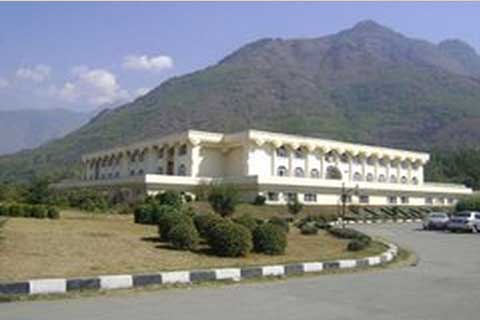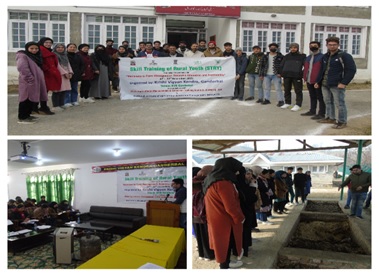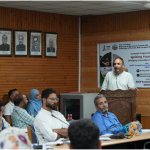Srinagar, Dec 24: The Agro field unit Srinagar, agro unit SKUAST-K and Indian Meteorological Department (IMD) on Saturday issued an advisory and appealed farmers to maintain proper drainage channels in fields to avoid water stagnation during winter.
Regarding care and management of rabi crops like brown, sarson, wheat, oat, pea, lentil, fodder crops and vegetables, the advisory asked farmers to maintain proper drainage channels in the field to avoid water stagnation during winter.
For saffron farmers the advisory asked farmers to apply split dose of Nitrogen in the form of urea @ 2.50 kg/kanal under high-density plantation and 1.50 under normal density.
“Ensure weed free crop rodents identify live rodent burrows. pouches (5-10 g) should be placed in these live burrows @ 1 pouch/burrow. Cut the pouch and immediately place it in the burrow after ensuring that certain amount of moisture is present where pouch is kept. Maintain proper drainage channels in the field to avoid water stagnation in winter,” it said.
The advisory has appealed farmers and orchardists to provide proper support to the limbs/plants which are not strong enough to withstand the load of snow.
Regarding cattle, it appealed farmers to take extra care in maintaining the proper temperature in animal sheds.
“Dairy cattle should be fed high quality forage and feed added with minerals especially sodium, potassium, magnesium along with supplementary fat. If you feel need of services of a veterinarian, contact a local veterinary or take advice from any clinical scientist empanelled on Telemedicine portal available on SKUAST–K website,” it said.
About Lumpy Skin Disease Virus (LSDV) of cattle the advisory asked people restrict the movement of healthy animals and quarantine diseased animals.
“The diseased animal is to be symptomatically treated by giving analgesic for controlling temperature, antibiotics to check secondary infection, antihistaminics, anorectic medicine, antioxidants plus vitamins A and E,” it said.
Regarding sheep and goat it said due to decrease in grazing resources, gradual shift to intensive feeding should be done. “Dry fodder should be provided @ 0.5 kg/animal and pelleted feed @ 300 gm/adult and 200 gm/weaner initially. Dry fodder should be gradually increased to 1to 1.5 kg/animal and concentrate/pelleted feed up to @ 500 gm/adult and 400 gm/young stock by last week.,” it said.
It also advised farmers to provide turnips and other root crops during the period for meeting nutritional requirements. Sanitation and cleanness in and around the livestock sheds should be maintained.
About poultry, the advisory said that due to the onset of winters, the environmental temperature has decreased, therefore due care is required with respect to the maintenance of brooding temperature inside the sheds.
“The ventilation must not be compromised at the cost of maintaining brooding temperature as it can lead to accumulation of ammonia gas in the sheds, wet litter and ascites in birds. The quality of litter should be given due consideration. Litter needs to be raked, renewed and replenished regularly. Adhere strictly to the vaccination schedule,” it said.
Regarding backyard poultry, it said due to fall in temperature, birds must be provided with a shelter having proper bedding material like sawdust, wood shavings, chopped straw, dried leaves etc.
“Additionally, birds should be supplemented with a grain mixture @ 1 handful for 5 hens. Deworming of birds should also be done periodically,” it said.
About the care and management of floriculture, it suggested farmers to inspect bulbs, corms, tubers etc. in storage and discard diseased and rotten ones if any.
“Prune the trees and shrubs to avoid damage by heavy snow during winter. Make preparations for protection of house plants during winter season,” it said.
For apiculture the advisory prepared by experts asked farmers to unite weak colonies with stronger colonies and narrow the entrance of the colonies. “Provide winter packing to the bee colonies. Provide winter feeding in the form of sugar candies if required,” it said.
Since the second commercial silkworm rearing has ended farmers are advised to ensure complete disinfection of rearing rooms and rearing appliances by spraying with 2% formaline plus 0.5% slaked lime. “Farmers can also spray with 5% solution of bleaching powder for disinfection of rearing appliances and rearing rooms,” it said.
Farmers have been advised to dismantle low cost rearing huts and preserve the various accessories of the hut under well roofed shed for future use.
“Ensure complete sun drying of cocoons before storage to avoid any fungal damage. Sorting of cocoons should be ensured before marketing to fetch maximum market price. Cocoon preservation should be done in gunny bags by hanging them under tin roofs or at dry places to avoid any damage by rodents,” it added.
For mushroom, it said that the first harvest of button mushroom is made 25 to 30 days after casing and the commercial crop is harvested up to 30 to 45 days.
“Pin heads of mushrooms generally start after 18 to 21 days after casing. Mushroom are picked up by twisting gently clock-wise and then anti-clockwise and afterwards it is pulled up very softly. After harvesting of mushrooms, casing material should be added and pressed gently to level the holes formed due to harvesting of mushroom,” it said.
Regarding fisheries, it said that nutrition and disease management are important aspects of aquaculture as temperature is touching minus degrees.
“Water temperature is also going down to freezing, the fish either stops feeding or accepts very less quantity of feed for maintenance. It is advised to store feed for trout/carp in a well- ventilated and cool place to avoid the shortage during snowfall,” it said.
The advisory suggested that in case of any mortality or sign of sickness in the fish stock immediately reduce the stocking density and quarantine the morbid fish.








